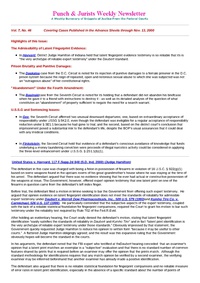Here the Court held that harmless error analysis applies to the failure to allege an element of a crime in the indictment - a ruling that is in conflict with pre-Apprendi decisions from the Third, Fourth, Ninth, and Tenth Circuits.
The Supreme Court’s discussion in Apprendi v. New …
Here, in response to an allegation that the prosecutor had repudiated its obligations under the plea agreement to recommend an acceptance of responsibility sentence reduction under U.S.S.G. § 3E1.1 by disclosing to the probation officer certain post-plea activities of the defendant, the Court held that the prosecutor "adequately balanced …
Here the Court vacated a pornography conviction after finding that the evidence was not sufficient to support a finding that the computer images at issue were ever transported in Interstate Commerce.
In this case the court considered a single issue: whether the evidence was sufficient to support a …
Where the defendants were sentenced to 151 months and to 235 months respectively, the Eleventh Circuit found no error because these terms were within the unenhanced maximum of twenty years provided by § 841(b)(1)(C). Each defendant was also sentenced to five years of supervised release, where § 841(b)(1)(C) calls …
Early in this opinion, Judge Garland ominously noted that “[t]his is not the first time federal courts have reviewed charges of sexual abuse by D.C. correctional officers against female inmates.” (Id., at 437). He emphasized that the previous cases found “a pattern of rape and sexual assault . . …
Here the court admitted latent fingerprint evidence testimony, holding that it is so reliable that it is “the very archetype of reliable expert testimony” under the Daubert standard - a statement that may not be supported by the scientific commumity.
The defendant in this case was charged with …
Here, without deciding whether circuit precedent holding that drug quantities in Title 21 prosecutions are sentencing enhancements rather than elements should be reconsidered, the Seventh Circuit found that any error was harmless where the indictment charged that defendants had handled "multiple kilograms of mixtures containing cocaine base" and that …
Here the Court held that evidence of a defendant’s conscious avoidance of knowledge that funds underlying a money laundering conviction were proceeds of illegal narcotics activity could be considered in applying a 3-level enhancement under § 2S1.1(b)(1).
Prior to Nov. 1, 1991, a defendant convicted of money laundering …
Here the court held that the government was not precluded from relitigating evidence of a defendant's motive in an earlier stabbing to prove retaliatory motive at a murder trial when the issue of the stabbing motive was governed by a lower standard of proof in the subsequent murder trial …
Here the Court affirmed the authority of the district court to grant a downward departure for acceptance of responsibility under USSG § 5K2.0, despite the fact that the court had ruled he did not quailfy for such a departure under USSG § 3E1.1.
The two defendants in this …
Here the Court held that a defendant did not abandon his briefcase when he gave it to a friend with instructions to destroy it, in a decision that is noted for its analysis of the concept of "abandonment" under the Fourth Amendment.
While investigating the defendant, Joseph Basinski, …
